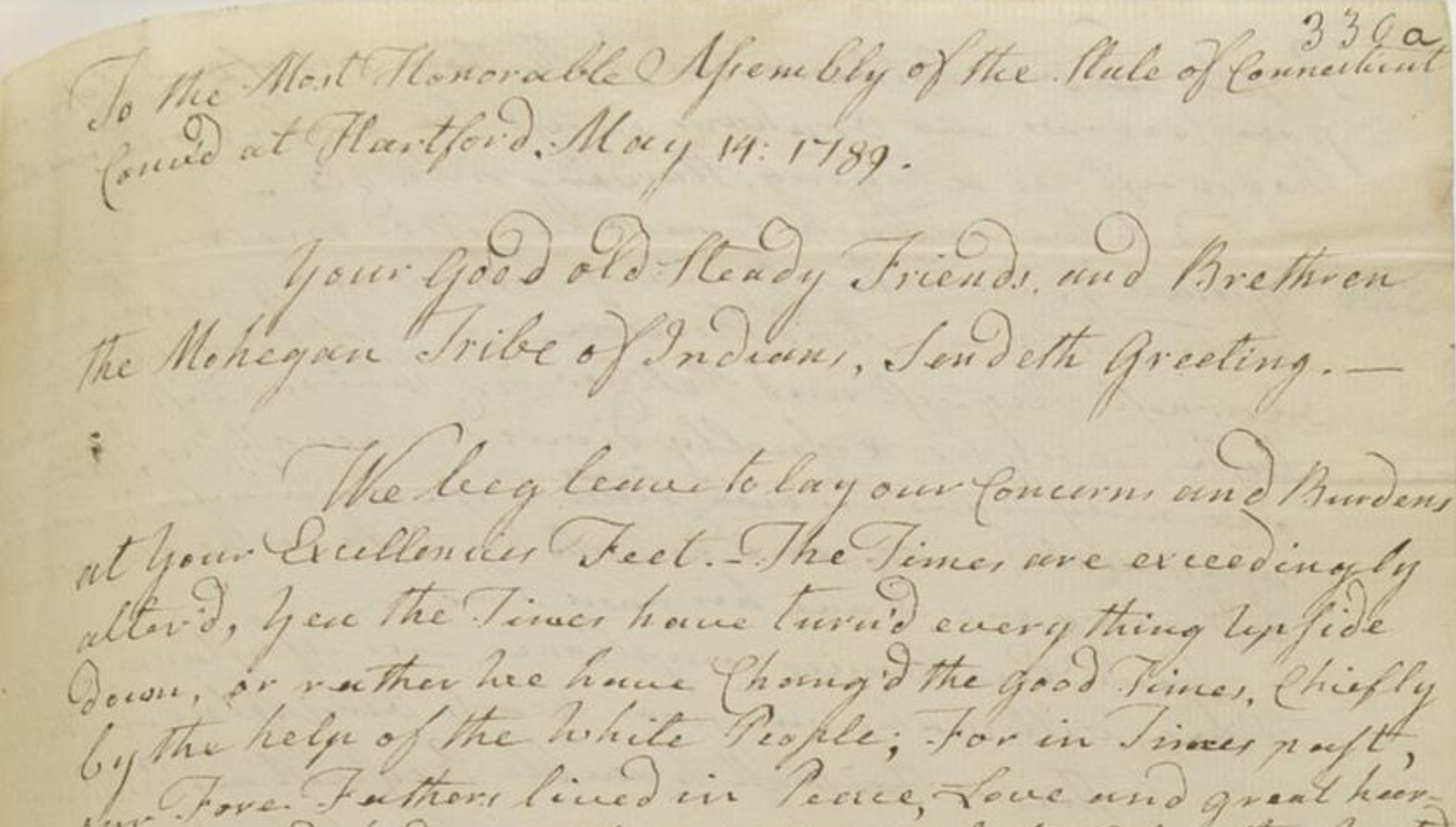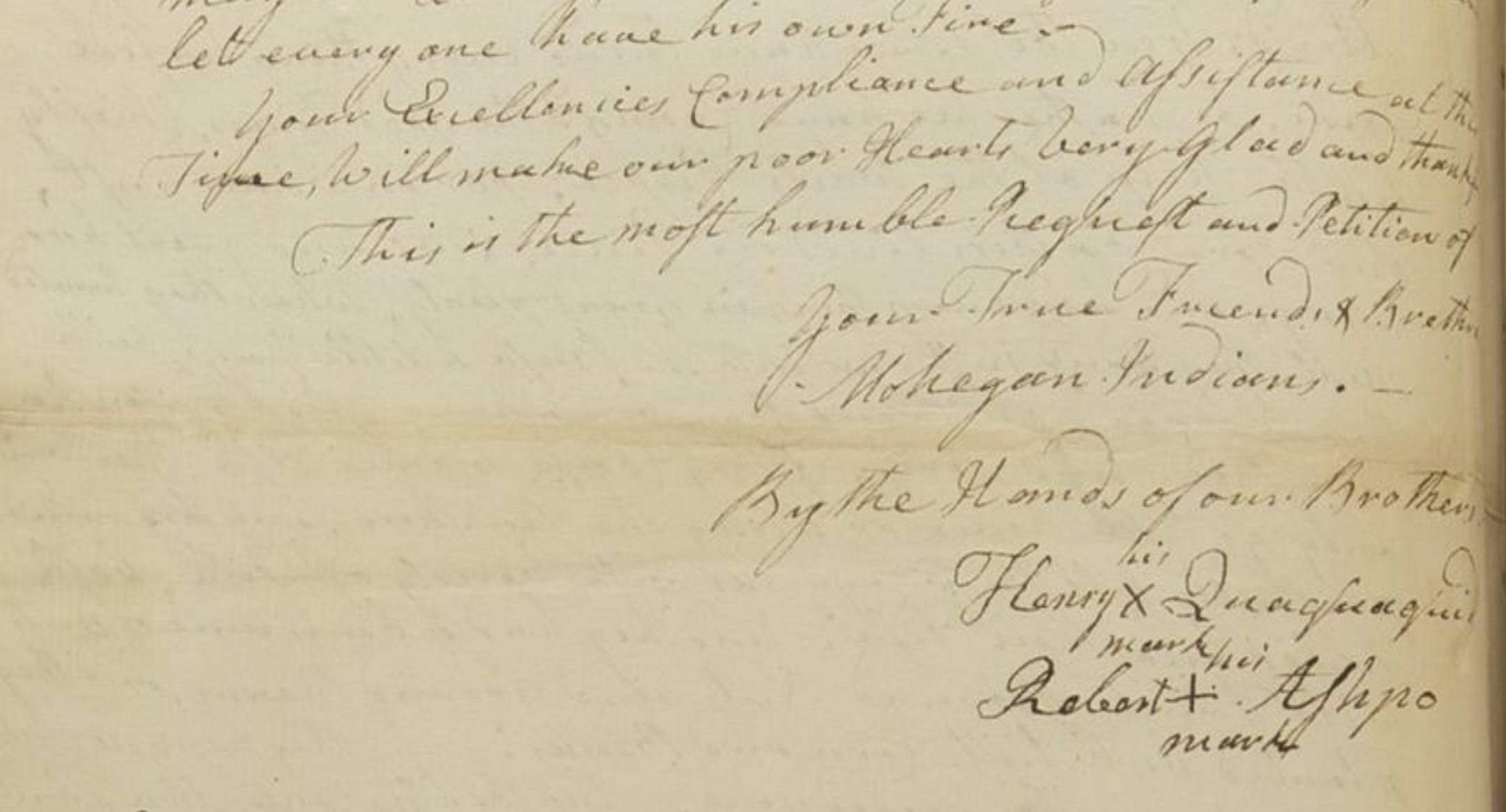
Excerpt, Mohegan Petition to the General Assembly, May 14, 1789. State Archives, Connecticut State Library. Accessed at Yale Indian Papers Project, Yale Digital Collections
Spelling has been standardized to modern English.
To the most honorable assembly of the State of Connecticut
convened at Hartford, May 14, 1789
Your good old steady Friends and Brethren, the Mohegan Tribe of Indians, sendeth greeting. –
We beg leave to lay our concerns and burdens at your Excellencies feet. The times are exceedingly altered, yea the times have turned everything upside down, or rather we have changed the good times, chiefly by the help of the White People;
For in times past, our Fore-Fathers lived in Peace, Love and great harmony; and had everything in great plenty. When they wanted meat, they would just run into the bush a little ways with their weapons and would soon bring home good venison, raccoon, bear and fowl, if they choose to have fish, they would only go to the river or along the sea shore, and they would presently fill their canoes with variety of fish, both scaled and shell fish, and they had abundance of nuts, wild fruit, ground nuts, and ground beans, and they planted but little corn and beans and they kept no cattle or horses for they needed none.—
And they had no contention about their lands, it lay in common to them all, and they had but one large dish, and they could all eat together in Peace and Love.—
But alas, it is not so now, all our fishing, hunting and fowling is entirely gone. And we have now begun to work on our land, keep cattle, horses, and hogs; and we build houses, and fence in lots. And now we plainly see, that one dish and one fire will not do any longer for us.—
Some few there are, that are stronger than others; and they will keep off the poor, weak, the halt, and the blind, and will take the dish to themselves. Yea, they will rather call the White people and [Black people] to eat with them out of our dish, and poor widows and orphans must be pushed [to] one side and there they must set a crying, starving and die.
And so we are now come to our good brethren of this Assembly, with hearts full of sorrow and grief, for immediate help.—
And therefore, our most humble and earnest request and petition is that our dish ..., may be equally divided amongst us, that every one may have his own little dish by himself that he may eat quietly, and do with his dish as he pleased and let everyone have his own fire.—
Your excellencies compliance and assistance at this time, will make our poor hearts very glad and thankful,
This is the most humble request and petition of
Your true friend and brethren
Mohegan Indians.—
By the hands of our brothers
Henry Quaquaquid
Robert Ashpo
In the Upper House
Jesse Root Esquire is appointed with such gentlemen as the Lower House shall appoint a committee to take into consideration the foregoing memorial and matters therein alleged and what ought to be done thereon or to report by bill or otherwise, George Wyllys.

Excerpt, Mohegan Petition to the General Assembly, May 14, 1789. State Archives, Connecticut State Library. Accessed at Yale Indian Papers Project, Yale Digital Collections
Summary and Additional Information
The year this petition was submitted is significant. May 1789 is a little more than a year after Connecticut became the fifth state of the new United States of America. Connecticut's economy was not strong after the Revolutionary War. The state's land was all divided among settlers. That means that anyone who wanted land had a hard time getting it. Many sons of Connecticut farmers were moving north to Vermont or west to the frontier to find good farmland.
The Mohegan Reservation has been established in 1671. Over the years, the colony's leaders took more and more Mohegan land for white settlers. (See chapter 17.)
A petition is a piece of persuasive writing. This petition begins by flattering the members of the General Assembly. It also reminds them of the long allegiance of the Mohegan to the Connecticut government going all the way back to the Pequot War. (Read about the Pequot War on pages 75 and 76.)
The petition asks for the state government's help because "the times have turned everything upside down" because of the actions of the "White people."
The Mohegan describe their traditional way of life, including their ways of getting food, and the way they held their land in common.
"For in times past, our Fore-Fathers lived in Peace, Love and great harmony; and had everything in great plenty. When they wanted meat, they would just run into the bush a little ways with their weapons and would soon bring home good venison, raccoon, bear and fowl, if they choose to have fish, they would only go to the river or along the sea shore, and they would presently fill their canoes with variety of fish, both scaled and shell fish, and they had abundance of nuts, wild fruit, ground nuts, and ground beans, and they planted but little corn and beans and they kept no cattle or horses for they needed none. —And they had no contention about their lands, it lay in common to them all, and they had but one large dish, and they could all eat together in Peace and Love."
But, the petition says,
"it is not so now, all our fishing, hunting and fowling is entirely gone. And we have now begun to work on our land, keep cattle, horses, and hogs; and we build houses, and fence in lots. And now we plainly see, that one dish and one fire will not do any longer for us."
Deer, bear and other sources of meat had been over hunted and become scarce. Forests had been cleared for fields and farms. Animals had lost their habitats. The Mohegan say they had had to turn to British colonial ways.
The petition asks "that our dish … may be equally divided amongst us, that every one may have his own little dish by himself that he may eat quietly, and do with his dish as he pleased and let everyone have his own fire."
As a result, the state overseers were authorized with the agreement of the adult Mohegan men (leaving out the women) to divide the Mohegan land and make improvements to it in a way that was fair and beneficial to all, and to make changes in the way the tribe governed itself in a way "agreeable to their customs."
While this may sound good, do you think the Mohegan wanted to change from their way that was like "one large dish," and "one large fire?"
How does this petition illustrate the difference between the traditional Mohegan way of life and the British Americans' way of life?
